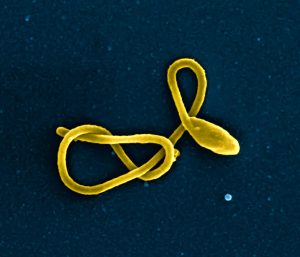Scientists found antibodies to Ebola virus in people up to a year before the 2018 Ebola virus disease outbreak began in the Eastern Democratic Republic of Congo, or DRC. This suggests that either early cases may have been missed or that exposure occurs more commonly than previously thought, according to a study led by the University of California, Davis.

The study, published today in the journal One Health Outlook, also documents the first detection of antibodies to Bombali ebolavirus in a person, showing that spillover of that virus from bats to humans has likely occurred. Scientists from the UC Davis One Health Institute and Columbia University discovered Bombali virus — a sixth ebolavirus species — in bats in Sierra Leone in 2018.
“This study highlights that, yes, these are lethal diseases, but there’s a range of severity — not everyone who is exposed dies,” said lead author Tracey Goldstein, an associate director of the One Health Institute at the UC Davis School of Veterinary Medicine. “Spillover doesn’t always cause lethal outbreaks. To prevent outbreaks, we need a better understanding of what’s happening between them. If you really are trying to understand how a virus works, you need to study it at all times, not just during an outbreak.”
- England: H5N2 avian Influenza detected on Kent farm, Risk to public health low
- Dengue cases top 800 in Saint Lucia, 3,000% increase from 2019
- Australia: Shigella outbreak reported at Richmond State School in Townsville
- African Swine Fever in Germany: 123 cases confirmed, All in wild boar
- Tennessee: Zoo Knoxville reports SARS-CoV-2 positive Malayan tiger

